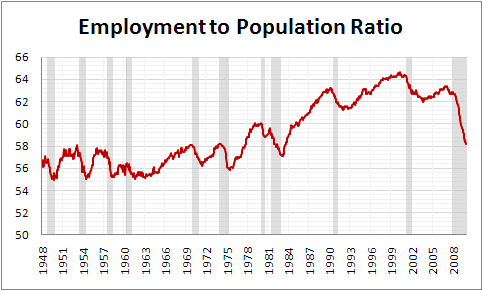I saw two interesting stories yesterday at Yahoo.com. First, a discussion of what the Fed would like to see before “tightening” monetary policy:
SHANGHAI (Reuters) – It would be good to see more improvement in the U.S. job market before exiting some stimulus programs, a top U.S. Federal Reserve official said on Friday.
James Bullard, president of the St. Louis Federal Reserve Bank, said the U.S. economy was improving but some policies put in place to support the recovery should not be withdrawn yet.
“We haven’t even seen a positive jobs report in the U.S. economy. We’d like to see at least one month of positive jobs growth,” he told students at a university forum in Shanghai.
Why did I put quotation marks around “tightening?” Because it implies that current policy is easy. The article also says:
The Fed has chopped interest rates to near zero and pumped hundreds of billions of dollars into the financial system to guide the world’s largest economy through the worst crisis since the Great Depression.
Of course it is also true that a few years back the BOJ chopped interest rates to near zero and pumped hundreds of billions of dollars into the financial system to guide the world’s third largest economy through the worst crisis since the Great Depression. And Bernanke once argued that their policy was (despite appearances) actually contractionary.
In any case, Mr. Bullard will not have to wait any longer; we now have “at least one month of positive jobs growth:”
WASHINGTON (Reuters) – U.S. employers unexpectedly cut 85,000 jobs in December, cooling optimism on the labor market’s recovery and keeping pressure on President Barack Obama to find ways to spur job growth.
The Labor Department said on Friday that November payrolls were revised to show the economy actually added 4,000 jobs rather than losing 11,000 as initially reported, breaking a streak of consecutive losses that dates back to December 2007.
I don’t want you pessimists to pay any attention to the 85,000 jobs lost in December. Look at the bright side; we gained 4,000 jobs in November. The recovery continues to zip right along. Let’s hope the Fed doesn’t let this boom get out of hand. Right now Corporate America is squeezing more effort out of fewer workers. Profits are increasing. The S&P seems to rise almost everyday. All is well.
Every researcher who has studied the Great Depression, and that includes me, Friedman and Schwartz, Temin, DeLong, Eichengreen, Romer, Clark Johnson, Hamilton, and yes, Ben Bernanke, reaches a point where they scratch their head an wonder “what could people have been thinking?” Often that point is reached in October 1931, when after two straight years or unrelenting jobs losses, the Fed decided to raise interest rates. Now I don’t want to compare the current situation to 1931. We have not had two years of unrelenting job losses. After all, we did gain 4,000 jobs in November.
The comment that perfectly encapsulates the mindset of central bankers in the early 1930s was a line by Hawtrey that is often cited by Krugman:
Fantastic fears of inflation were expressed. That was to cry Fire, Fire in Noah’s Flood.
Of course Krugman might be wrong this time. But note that years ago Krugman used this line while discussing fears of inflation in Japan. And he was right. I wouldn’t bet against him being right again.
In case you think the comparison to 1929-31 is pure hyperbole, check out this very informative graph on the employment to population ratio from Mark Thoma.

I’m not saying it is nearly as bad as 1929-31, and I do think we will get some jobs in 2010 (unlike 1932.) But it sure looks far worse than 1981-82, doesn’t it?
Disclaimer: This page contains affiliate links. If you choose to make a purchase after clicking a link, we may receive a commission at no additional cost to you. Thank you for your support!


Leave a Reply